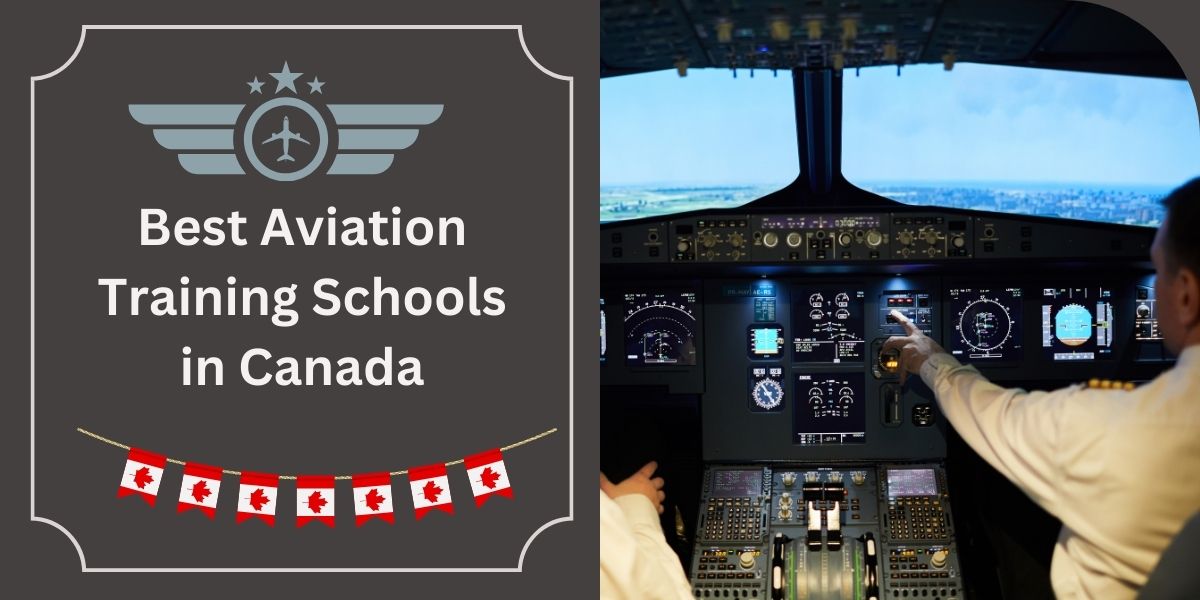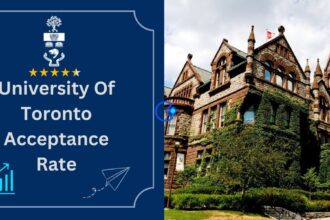Embarking on a career in aviation is an exhilarating journey filled with opportunities for adventure and personal growth. In Canada, aspiring pilots have access to some of the world’s best aviation training schools, each offering a unique blend of expertise, innovation, and hands-on experience.
Whether you dream of flying commercial airliners, conducting search and rescue missions, or piloting private jets, these institutions provide the perfect launchpad for your aviation ambitions.
In this article, we will discuss the 10 best aviation training schools in Canada, their eligibility requirements, and some important things you need to know.
Is Canada Good for Aviation?
Canada is absolutely a good place for aviation; Canada has the second-highest population of pilots in the world, with 70,000 pilots.
They have some of the most respected modern air traffic control systems, weather forecasting systems, and infrastructure. They also have some of the best-standard aviation licenses in the world.
Eligibility Requirements to Get into Aviation Training Schools In Canada
To get into any aviation training school in Canada, you need to satisfy the following requirements:
- As a rule, students must be at least 18 years old or have reached the age of 18 in the first semester of their studies.
- Colleges also require students to speak English.
- You may need to take a test to show that you are very familiar with both reading and writing in English. However, many schools offer this test online.
- Schools may also require students to have the equivalent of a high school diploma.
10 Best Aviation Training Schools in Canada
Here’s a list of the 10 best aviation training schools in Canada in 2025:
1. Georgian College
Georgian College, a huge Ontario school with seven campuses and 12,500 students, offers a three-year Aviation Management Diploma course from the Barrie campus in scenic Kempenfelt Bay. It is among the best aviation schools in Canada.
The course, which was run by the Canadian Aviation Institute (CAvI) in Georgia in 1986, aims to provide students with a combination of theoretical understanding and practical aviation and management experience.
There is also a compulsory component for work experience in the industry. Graduates receive a diploma qualification and can study abroad for an additional year to get either a Bachelor of Science degree from the Embry-Riddle Aeronautical University of Florida, a Masters in Aviation Management from Griffith University in Australia, or a Masters in Transportation Policy at Loughborough University to acquire in the United Kingdom.
2. Fanshawe College
Fanshawe College hosts the Norton Wolf School of Aviation Technology, a pragmatic industry-focused flight school located in a new $10 million hangar at London International Airport.
Norton Wolf offers courses in three areas: aircraft and engine maintenance, avionics maintenance, and structural training for composite aircraft.
Courses include drone operator, unmanned aerial vehicle operation (drones), aircraft structure repair technician, aeronautical engineer, aircraft maintenance, avionics maintenance, aeronautical engineering, aircraft maintenance, and avionics.
The school offers a varied fleet of 18 aircraft, 80,000 square feet of study space, and Canada’s only in-school virtual maintenance training lab.
3. Moncton Flight College
Founded in 1929, Moncton Flight College is a pilot training school at Greater Moncton International Airport in Dieppe, New Brunswick, and Canada’s largest private flight school.
The college has a second location at Fredericton International Airport in Lincoln, New Brunswick, where most students come from China. The school offers a Bachelor of Science in Aviation, an Integrated Airline Pilot (IATP), and an Integrated Commercial Pilot Course (ICPC), as well as modular pilot training programs.
Since its inception, the college has trained over 20,000 pilots from around 70 countries and has received approvals from Transport Canada and the CAAC (Civil Aviation Administration of China).
According to the school, Moncton alumni hold positions as chief pilots, chief flight instructors, and government officials. Thus, it has established respect among the aviation schools in Canada.
4. Confederation College
Confederation College, Ontario, hosts the Aviation Centre of Excellence (ACE), an aviation hub at Thunder Bay International Airport, which has an apron and a runway.
At ACE, the Confederation College offers five aviation courses: Aerospace Engineering, Aerospace Engineering—Aircraft Maintenance, and Aviation Flight Management.
These are two- to three-year diplomas with a focus on expertise, created in consultation with industry professionals. The establishment of ACE includes two hangars and classrooms, laboratories, shops, and three full-time aviation programs.
5. Seneca College
Next on the list of best Aviation training schools in Canada is Seneca College.
The Seneca College Greater Toronto School of Aviation offers flight qualification, aerospace technology, and aviation security. The college also runs an aviation pilot flight program that includes flight operations, administration, and hands-on training.
Graduates of this course can enter an airline and directly take up a position as an officer, which is strongly connected to the industry. For example, all graduates of the Seneca Airline Pilot Program are eligible for interviews with Air Georgia.
6. Sault College
Founded in the 1960s as a vocational school, Sault College in Ontario has been training professional pilots since 1974 and uses the facilities at Sault Ste. Marie International Airport. It is considered one of the top-notch flight schools in Canada.
Sault’s approach to aviation is practical and focuses on expertise. These include flight operations courses, airport administration and services, airport wildlife management, aviation technology flight, and aircraft structure repair engineers.
Students train on a fleet of Zlin 242L and Piper Seminoles. Some courses, including aeronautical flight, are only open to Canadian nationals.
7. Western University, Canada
Although Western Union Canada (Western) is not one of the largest Canadian aviation universities, it holds a recognized bachelor’s degree in commercial aviation management (CAM).
This course has a flight option that allows students to graduate with a Transport Canada-approved Integrated Commercial Pilot License (ICPL) with multiple engines and instrument ratings.
This means that graduates can work as professional pilots or take on leadership roles with an airline. The University has the reputation of being one of the best aviation schools in Canada.
8. University of Fraser Valley
The University of Fraser Valley is one of the 10 best aviation training schools in Canada.
Aerospace students at the University of the Fraser Valley (UFV) in southwestern British Columbia may choose either an academic path combining flight training with a bachelor’s degree in business administration or a more practical option to earn a two-year degree to gain a pilot license.
The Bachelor’s teaches a combination of flight and business skills, while the diploma combines instruction, flight training, simulator training, and training with multiple engines and instruments.
The university also offers a program for aircraft technicians. A course approved by Transport Canada provides a thorough introduction to the repair and maintenance of aircraft.
However, the UFV does not include flight training in its curriculum. Instead, students take part in external flight courses with an approved flight training provider and transfer the course credits to UFV. It has, over the years, earned a reputation as one of the best aviation training schools in Canada.
9. University of Waterloo
The two aviation degrees from the University Of Waterloo (UW) were first introduced in 2007, but have already made a name for themselves because they combine practical training with academic education.
Students studying geography and aeronautics at the Faculty of Environmental Sciences learn to identify landforms, use multi-layered maps, understand weather patterns, and fly an airplane. You have a Bachelor of Environmental Studies and a commercial pilot license.
The Faculty of Science’s “Science and Aviation” degree aims to prepare students for careers in the aerospace industry.
Students can specialize in physics or geosciences and gain a Bachelor of Science and a commercial pilot’s license. It is one of the top aviation training schools in Canada.
10. The British Columbia Institute of Technology
The Burnaby British Columbia Institute of Technology (BCIT) has been offering aerospace courses for more than half a century. It is the first institution to be considered the best aviation training school in Canada.
The courses will be held on BCIT’s Aerospace Technology Campus, which is located on a 40,000-square-foot hangar housing the school’s fleet of light piston and business aircraft, turboprops, and light and medium helicopters.
BCIT has also been home to several prestigious research projects, such as the ongoing study by the National Research Council of Canada (NRC) and Boeing Commercial Airplanes on the use of hydrogen in a tailor-made fuel cell system to reduce greenhouse gas emissions.
BCIT graduates play more of a role in the aviation industry than graduates of other colleges in British Columbia. The courses are designed to train aircraft maintenance technicians (avionics and maintenance), gas turbine/jet engine technicians, airport operations specialists, and professional pilots.
What is the cost of studying aviation in Canada?
New students often have questions about the cost of these programs. Many of those who enroll are adult students who want to change careers or those who did not go to school at a younger age.
Others are younger students with a passion for aviation. The total cost of the program often depends on whether it is a diploma/certificate program or a program that ends with an actual degree.
Aviation programs are often more expensive and require students to pay for their materials and textbooks. Airline programs in the country can cost between $5,000 and more than $20,000 per year.
How Much Does a Pilot Earn in Canada?
On average, pilots in Canada earn $88,427. However, their salaries range from $27,876 to $335,424; your salary as a pilot in Canada depends on your current level.
Can poor students study aviation?
There is no direct yes-or-no answer to the question. Poor students will have to work harder than good or average students to become anything they want. So a poor student who is willing to work hard and give ample time to detailed studies can become a pilot.
Can Canadian pilots work in the USA?
Yes, a Canadian pilot can indeed practice the pilot profession in the US once they apply for a license through the Federal Aviation Administration (FAA).
This FAA will require you to write a US pilot license examination after reviewing your Canadian credentials, Your grade after writing the license exam will determine if you will be allowed to practice your profession.
Can an international student become a pilot in Canada?
Yes, the answer is yes! According to the Government of Canada, in order to apply for a Postgraduate Work Permit (PGWP), you must meet one of these requirements: you have completed a flight training course at a training center in Canada and now have a Canadian commercial pilot license, etc.
Conclusion
Canada’s top 10 aviation training schools offer aspiring pilots the opportunity to pursue their dreams, and also embark on rewarding careers in the dynamic field of aviation.
From coast to coast, these institutions also provide with the knowledge, skills, and experience needed to succeed in the ever-evolving world of aviation.
Whether you’re interested in flying commercial airliners, conducting search and rescue missions, or piloting private jets, Canada’s aviation training schools provide the perfect foundation for a successful aviation career.




 Jobi.ng
Jobi.ng








